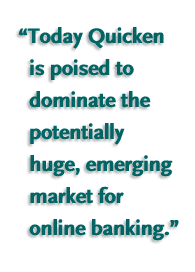 t a time when most of us were just beginning to use ATMs, Scott Cook was banking on a simple vision shared by practically no one else. He believed that, given the tools, consumers would balance their checkbooks at home on a computer. Scott and partner Tom Proulx were struggling Silicon Valley entrepreneurs in 1983, the year they launched Intuit, a software company built precariously around a single, unglamorous program that provided those tools. They called their software Quicken.
t a time when most of us were just beginning to use ATMs, Scott Cook was banking on a simple vision shared by practically no one else. He believed that, given the tools, consumers would balance their checkbooks at home on a computer. Scott and partner Tom Proulx were struggling Silicon Valley entrepreneurs in 1983, the year they launched Intuit, a software company built precariously around a single, unglamorous program that provided those tools. They called their software Quicken.Today Quicken is poised to dominate the potentially huge, emerging market for online banking. Hundreds of thousands of consumers are already paying bills and managing accounts electronically. By the end of the decade, millions more will likely follow. Scott Cook's vision for an inexpensive, easy-to-use personal finance program has already paid off for Intuit. Last year the company made $395 million in sales and was nearly acquired by Microsoft, whose $1.5 billion takeover bid was quashed by the U.S. Federal Trade Commission. Not everyone believes that transferring money by modem is the greatest banking invention since the drive-up window -- at least not until some of the security concerns about the Internet are ironed out. But they will be. And when that happens, Cook and company will likely be crowned the kings of cybercash.
|





